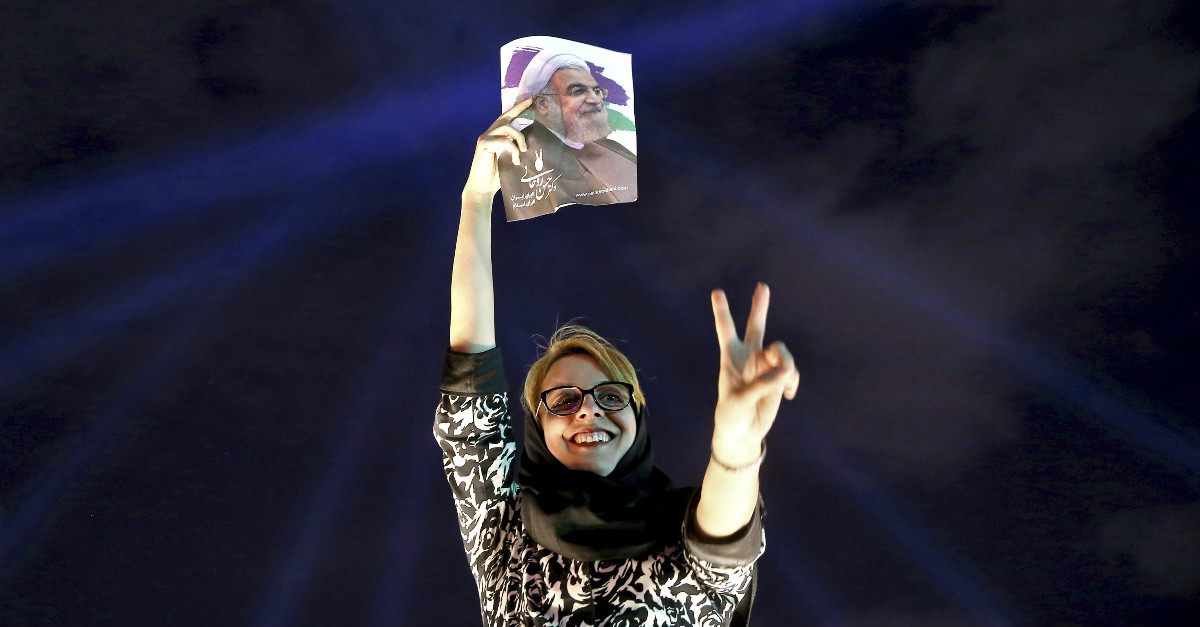What is there to say about Donald Trump’s maiden voyage to our great and glorious ally Saudi Arabia? The awkward white-guy shuffle was danced. Steve Bannon was bodily engulfed by Saudi royals. One of those orbs from “Where in Time is Carmen Sandiego?” was fondled. And…oh yeah, also an arms deal worth $110 billion was signed, as America reasserted its default blind eye towards Saudi empowerment of terrorism in Yemen, Syria, and beyond.
Videos by Rare
The Saudis are obsessed above all with their endless cold war versus Iran, and their main goal with Trump was to renew America as an accomplice to their side. While Trump was acquiescing to their cajolery, Iran was doing something the Saudis never have: holding a presidential election. And the message that emerged once the counting was done is clear: Iranians are ready for moderation, for openness, for their country’s relations with the West—locked in deep freeze since the Islamic Revolution in 1979—to at last begin to thaw.
Hassan Rouhani, the current president of Iran who was instrumental in negotiating the nuclear deal and favors more international engagement, was reelected in a landslide with 57 percent of the vote, while his hardline opponent Ebrahim Raisi mustered only 39 percent. Reformists also gained a plurality of seats in the Majlis, the Iranian parliament, and captured every city council position in Tehran. Rouhani now has both a mandate for more liberal reforms and an expectation that he’ll reconstruct Iran’s dilapidated economy, which hasn’t benefitted much from the nuclear deal. The reason is that Iran’s security services, especially its Islamic Revolutionary Guard Corps (IRGC), are deeply entangled in their country’s commerce and many of those groups are still subject to sanctions by the West. This has left potential investors wary, lest they accidentally do business with an extremist and get slapped with a fine.
RELATED: Poll finds yuge and expanding support for the Iran nuclear deal
It’s a devilish conundrum and Rouhani will struggle with it going forward as the IGRC continues to lurk in the bushes, waiting to capitalize on his mistakes. Still, don’t let yourself become like Elliott Abrams. Abrams, a leading neoconservative and veteran of the Iran-Contra scandal though not of any wars, actually wrote a piece issuing a (partially tongue-in-cheek?) endorsement of Raisi, who he called the “true face of Iran” whereas Rouhani was a mere “facade.” In that same vein, Sohrab Ahmari exhorted Iranian Wall Street Journal readers not to vote in the “sham elections.”
President Obama once accused American hawks of making “common cause” with Iranian hardliners; now they’ve gone and illustrated his point. How refreshing that Iran’s disproportionately young and forward-gazing electorate ignored them.
It is true, as the critics constantly remind us, that Iran is far from a model democracy: its Guardian Council disqualifies any candidates lacking in fealty to the regime and the most powerful figure in government is not the president but the lifetime-tenured supreme leader. Nonetheless, these are not the days of the Iran-Iraq War, with most of Iranian political life consolidated under a single powerful ayatollah. A meaningful clash of opinion between reformists and hardliners exists in the Iranian system, and the election campaign was a key public space for that debate.
RELATED: Contra Rex Tillerson, the Iran deal is working and Donald Trump shouldn’t mess with it
Ayatollah Khamenei, the supreme leader, passive-aggressively slapped Rouhani during the campaign. Rouhani bashed Iran’s clergy and security services as “extremists.” He won nonetheless. Iran might not be a free republic, but its government does have a weighty democratic element, which voters are using to advance an agenda of incremental and nonviolent change. The IRGC and friends still control Iran’s foreign policy, puppeteering oppressive Shiite militias in Iraq and provoking American ships in the Strait of Hormuz, but they’ve lost the support of the people, and even in a partial dictatorship, that counts for something.
The real reason American hawks are so eager to dismiss Iran’s democratic exercise is because Rouhani’s election amounts to an endorsement of the nuclear deal, which for them has become a totem of unbridled hate. A secondary reason is that an Islamic dictatorship moderating gradually and from within is anathema to their ideology, which still favors radical shock therapy against hostile regimes despite the spectacular failure of that approach in Iraq and Libya. This is the same school that accused Ronald Reagan of selling out when he negotiated with the Soviets. We should be grateful to the Iranian people for repudiating them—and for staking a claim to their country’s future.



